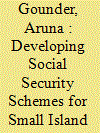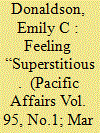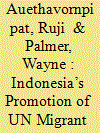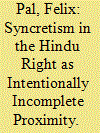|
|
|
Sort Order |
|
|
|
Items / Page
|
|
|
|
|
|
|
| Srl | Item |
| 1 |
ID:
184237


|
|
|
|
|
| Summary/Abstract |
The global spread of Pentecostalism has been facilitated by a combination of transnational impulses and indigenizing interests. In the case of independent Pentecostal megachurches, their growth in urban centres is reflected in both Western and Asian societies. Megachurches in America and Southeast Asia have flourished because of their unique blend of middle-class congregants, appeal to consumerist and popular culture, as well as their compatibility with the urban lifestyle patterns of their congregants. However, it would be a mistake to assume that the drivers of growth and the conditions behind the common features of these megachurches are the same. Examining Jakarta, Surabaya, Kuala Lumpur, and Manila, we show that megachurches are not located in shopping malls and commercial complexes merely for growth purposes or to align with the consumerism ethos of capitalism. Deeply local concerns, such as hostile neighbourhoods dominated by Muslim or Catholic majorities, have led to the camouflaging of Christian symbols in urban settings. The purposeful targeting of youth also reveals the Southeast Asian megachurch engaging with the new urban mobilities triggered by rapid economic development. We conclude that the Southeast Asian city’s structure and layout are being repurposed by Christian innovation and reinterpretation. Christianity in the Southeast Asian city is hidden in plain sight.
|
|
|
|
|
|
|
|
|
|
|
|
|
|
|
|
| 2 |
ID:
184241


|
|
|
|
|
| Summary/Abstract |
COVID-19 has triggered deep economic damage and devastated livelihoods to an extent never before experienced. It has revealed socio-economic vulnerabilities and so can be used as a learning platform in preparing for future shocks. In particular, it has exposed the vulnerability of households to sudden, severe, and prolonged income shock, the significance of social security as a shock response tool, and the importance of household resilience for macroeconomic stability. This study uses the pandemic as an opportunity to understand the resilience of Fijian households to profound and prolonged income shocks, given these households’ social, cultural, and economic setting. It evaluates national response strategies, household coping mechanisms, and gaps in the current social security measures in Fiji. This evaluation reveals several key lessons for a systematic response to any future shocks. The lessons may prove beneficial not only for Fiji, but also for other similar economies in the region. Policy makers can build on the operational learning and capacity developed during the pandemic, reinforce existing social security systems, and be better prepared for future income shocks. Fiji and other Pacific Island economies are highly vulnerable to climate-related risks and have endured the adverse economic effects of some extremely intense natural disasters. It is important for these economies to strengthen household resilience and develop sustainable and broad-based programs for social protection.
|
|
|
|
|
|
|
|
|
|
|
|
|
|
|
|
| 3 |
ID:
184239


|
|
|
|
|
| Summary/Abstract |
For many Indigenous peoples, ancestral lands are a source of nourishment, strength, and sovereignty that counteracts colonial legacies of violence and hegemony. However, the feelings associated with place and the land can also be complicated by embodied fear and ambivalence. What happens when the remnants of colonialism feed feelings of ambivalence, shame, or fear of the land? How do these lasting emotional scars on Indigenous minds and bodies impact Native place making, today? This paper problematizes the role of ancestral lands and affective place making in shaping Indigenous identity, sovereignty, resource management, and sustainability. In the Marquesas Islands of French Polynesia, ancestral places are felt as much as seen, and the spirits that dwell there can be dangerous. The active concealment of these Marquesan reactions and relationships to place illustrates the blending of colonial and Indigenous histories and values in ambivalent, affective experiences on the land. Thus, even as islanders work to revitalize their traditional culture and build a sustainable future based on ancestral places, reticence complicates local relationships to the land and the vital hopes they represent. As global sustainability efforts emphasize the conservation of lands inhabited by Indigenous communities, recognizing the conflicted, emplaced emotions and experiences of local peoples will be a key part of understanding such areas and how to preserve them.
|
|
|
|
|
|
|
|
|
|
|
|
|
|
|
|
| 4 |
ID:
184240


|
|
|
|
|
| Summary/Abstract |
Scholars have devoted insufficient attention to Indonesia’s foreign policy on migrant worker protection, especially as mobilized in multilateral institutions. This article addresses such knowledge gaps by analyzing why Indonesia has, for almost two decades, persistently promoted the United Nations Migrant Worker Convention in the Association of Southeast Asian Nations (ASEAN) despite constant pushback from migrant-receiving countries. It argues that Indonesia’s persistence is driven by its locally constituted meaning of migrant worker rights. In particular, this article advances the critical norms approach in international relations to demonstrate that its interpretation is influenced by “Indonesia’s normative baggage,” or past experiences with labour migration that have too frequently dealt with the exploitation of Indonesian citizens abroad. This normative baggage in turn shapes the country’s diplomacy and promotion of convention standards deemed appropriate for safeguarding Indonesian migrants in ASEAN. In presenting the argument, this article contributes to the study of labour migration by scrutinizing Indonesia’s foreign policy on migrant protection and unpacking norm interpretation processes that are necessary in international negotiations.
|
|
|
|
|
|
|
|
|
|
|
|
|
|
|
|
| 5 |
ID:
184238


|
|
|
|
|
| Summary/Abstract |
Religious syncretism can function as an instrument of inter-group control and domination. Rather than consistently promoting cross-religious forbearance and knowledge, syncretism enables a proximity that allows forms of violence otherwise inaccessible to religious majoritarian groups. By choreographing performances of syncretism between themselves and a subordinate religious community, organizations like the Indian Hindu nationalist Rashtriya Swayamsevak Sangh (RSS) produce an intentionally incomplete proximity. This proximity draws close minority groups like the RSS’ Muslim wing, the Muslim Rashtriya Manch, but without allowing final inclusion or incorporation. Muslim proximity to the RSS becomes a spectacle of humiliation and domination rather than a measure of inclusion into the Hindu right. Muslims must perform Hindu nationalist religious rituals, while denigrating mainstream Islamic tradition. Drawing on extensive interview-based fieldwork with the RSS and the Manch, I argue that syncretism can function as domination because it reinforces ethnic hierarchies, but that this domination is not a form of hierarchical encompassment. Rather, subordinate religious groups are kept in a perpetual humiliating limbo as a way to reify the superiority of a dominant religious group.
|
|
|
|
|
|
|
|
|
|
|
|
|
|
|
|
|
|
|
|
|